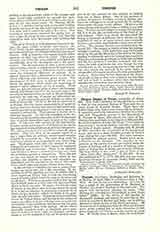

Theiner, AUGUSTIN, theologian and historian, b. at Breslau, April 11, 1804; d. at Civitavecchia, August 8, 1874. He was the son of a shoemaker. As a boy he was a pupil at the gymnasium of St. Mathias at Breslau, and studied theology in the same city. Together with his brother Anthony he wrote, “Einfuhrung der erzwungenen Ehelosigkeit bei den Geist-, lichen” (1828). At the advice of this brother he abandoned theology and turned his attention to law, which he studied at Breslau alzd Halle, and in 1829 he obtained a degree in law at the latter university. He then received a scholarship from the Prussian Government, which enabled him to make researches in Belgium, England, and France as to the sources of canon law. He finally went to Rome, where he settled permanently. Here, under the influence of Count Reisach then rector of the Propaganda and later cardinal, the change in his opinions was completed. In 1835 he wrote the “Geschichte der geistlichen Bildungsanstalten”, and in 1836 the “Disquisitiones criticae”, on the sources of canon law. Soon after this he became a priest and entered the Oratory of St. Philip Neri. In the succeeding years he wrote the following works: “Die neuesten Zustande der kath. Kirche in Polen and Russland” (1841); “Die Ruckkehr der regierenden Hauser Braunschweig and Sachsen zur kath. Kirche” (1843); “Zustande der kath. Kirche in Schlesien 1740-58” (1846); “Kardinal Frankenberg” (1850). He was commissioned by Pius IX, who had given him a position in the Vatican Library in 1850, to write the “Geschichte des Pontifikats Klemens XIV” (1853; Italian translation, 1855). In this work he showed himself an opponent of the Jesuits, with whom he had been on good terms until 1844, so that the work was forbidden in the States of the Church. In 1855 Pius IX appointed Theiner prefect of the Vatican archives. He now published his valuable collections of authorities drawn from these treasures: “Die Fortsetzung der Annalen des Baronius” (3 vols., 1856); “Veteramonument ‚Ä¢aHungarice” (2 vols., 1859-60); “Polonice et Lithuaniae” (4 vols., 1860-64); “Slavorum meridionalium” (2 vols., 1863); “Hibernorum et Scotorum” (1864); “Codex dominii temporalis apostolic sedis” (3 vols., 1861-62); “Monumenta spectantia ad unionem ecclesiarum Griecie et Romanae” (1872). Both before and during the Vatican Council he was in close connection with the opponents of Infallibility. Because he communicated to them the order of business of the Council of Trent that had been kept secret he was deposed from his dignities and offices. Whether he died at peace with the Church is doubtful. His correspondence with the Old Catholic Professor Johann Friedrich during the years 1870-73 shows that he had the same views as the latter; on the other hand Count Hermann Stainlein asserts that he knew Theiner during this period as a loyal Catholic priest. There is no doubt as to his large scholarship and his services to history. After his death appeared the work, “Acts genuina Concilii Tridentini” (1874), very imperfectly edited.
KLEMENS LOFFLER

